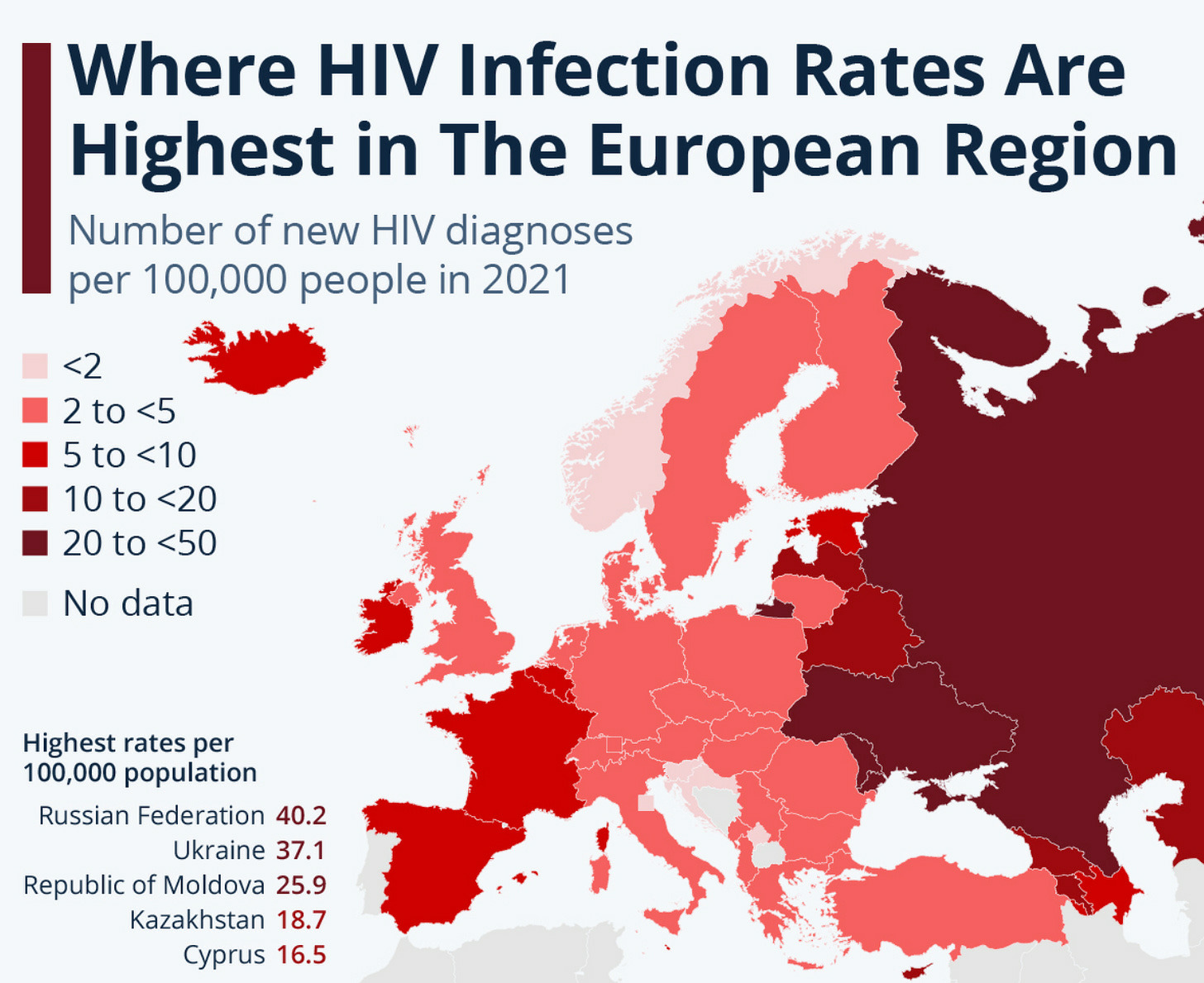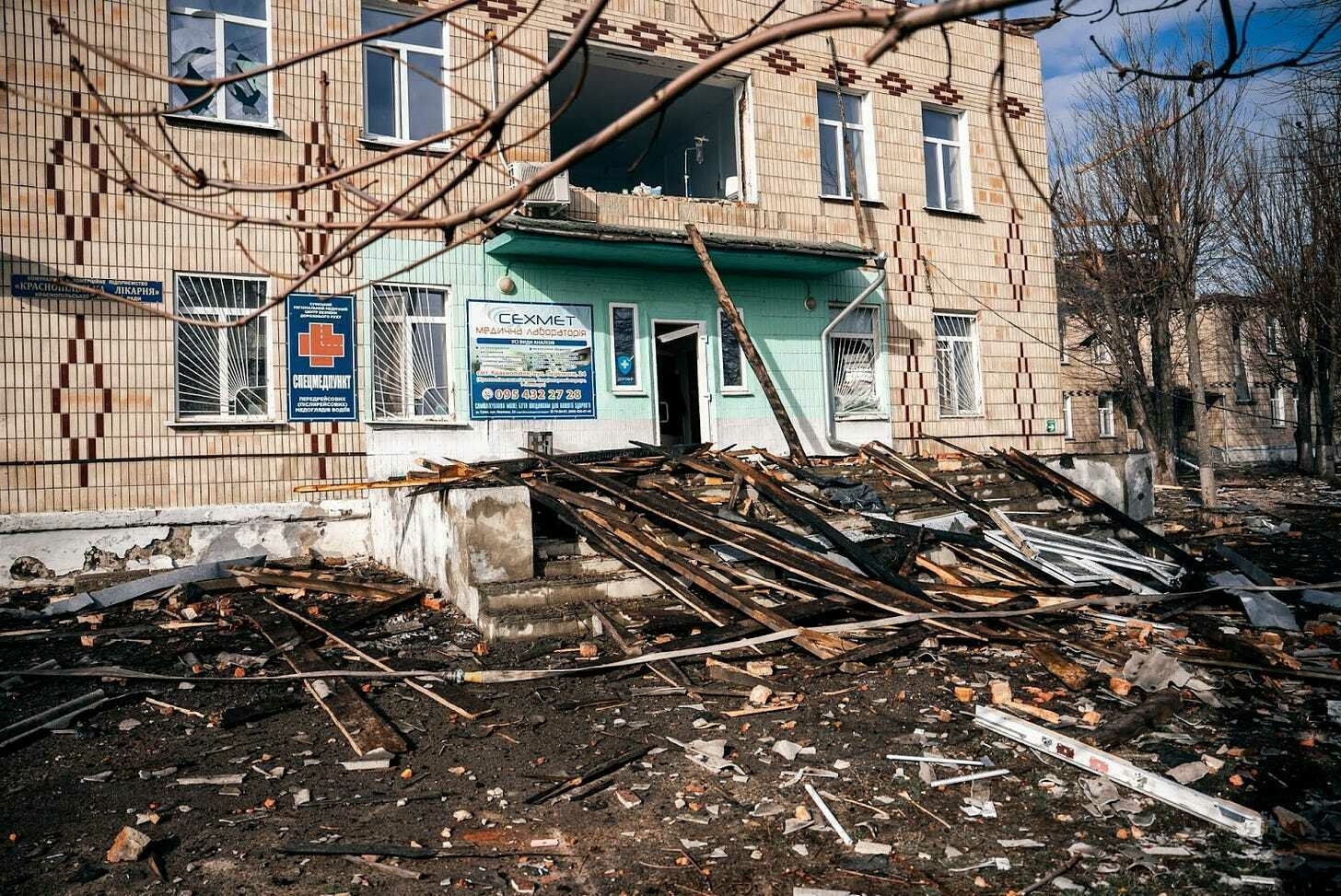Editor’s Note: The Counteroffensive exists to explore the human side of war – going beyond headlines to show how real people experience it.
We cover Ukraine not just as a battlefield but as a country with a rich culture, history, and traditions. Want to support this unique coverage? Upgrade today!

Valeriia feels the familiar tendrils of fear through her body as she walks into the hospital for her routine checkup.
Her HIV diagnosis is no longer a death sentence – one jar of pills means another month of life-saving medication. But today, the doctor slid just three blister packs across the counter instead of the usual six jars.
Stocks are dwindling. No one can tell her when, or if, more will come.
About 120,000 HIV-positive people are facing the same crisis across Ukraine. Since Trump took office in January, he has cut American foreign aid, which was key for Ukraine to obtain supplies for HIV treatment.
The Wall Street Journal reported that the U.S. government is also considering cutting domestic HIV prevention programs, which threatens to undo twenty years of efforts to fight the virus.
It's not just about aid - it's about a global health crisis caused by politics. Without prevention and treatment, new infections will increase, people will die, and the impact will be felt far beyond Ukraine, demonstrating how decisions in Washington can jeopardize public health around the world.
“Every time I go to bed, I am grateful I have these pills. Thanks to them, I have lived today and will live tomorrow. And usually, I know that I will live another six months or a year of my life, so I have medicine. But now it's only three months. And it scares me,” Valeriia said.
Valeriia Rachynska, 48, has been living with HIV for 15 years. She discovered it when a doctor suggested she and her husband take an HIV test amid a months-long illness of her husband that had remained undiagnosed for several months.
Both tests were positive.
HIV cannot be cured, but it is possible to reduce the viral load in the body so as to effectively eliminate the chances for transmission and minimize any symptoms. With a carefully planned cocktail of drugs, an HIV-positive patient can contain the condition.
As of this year, there were 336.1 HIV-positive patients per 100,000 people in Ukraine. Meanwhile in the United States, this figure is 388 per 100,000 in 2022.

For the past decades, international NGOs have been sending supplies to treat HIV to Ukraine, as Kyiv’s economy does not have the capacity to produce its own. A few years before Russia’s full-scale invasion, Ukraine’s government assigned a portion of its state budget to begin producing the medicine locally.
However, following Russia’s attack in 2022, NGOs considered it too risky to continue sending supplies to Ukraine.
There was a risk that about 120,000 HIV-positive Ukrainians would be left without medication at the beginning of the full-scale invasion, Yevheniia Rudenka, head of procurement at the ‘100% Life’ charity organization, said.
Suppliers did not want to risk going to Ukraine, she added.
“Back then [in 2022], at the most critical moments, they [doctors] would only give us medicine for a month. I know there were cases when doctors were forced to give out medicines for only two weeks because if they gave them for a month, someone would not have them tomorrow,” Valeriia said.
Through USAID, the United States stepped up its efforts to provide treatment in Ukraine, Rudenka said.
“The situation was critical then, but the United States came to the rescue,” Yevheniia said. “And thanks to this, this catastrophic pause did not happen in 2022. The support also continued in 2023 and 2024,” she said.

When Valeriia was diagnosed with HIV, Ukraine was forced to ration its antiretroviral medications due to a lack of ability. Supplies were prioritized for those in a more advanced and critical stage.
Doctors monitor a patient's CD4 cell counts, which show how healthy your immune system is. Since Valeria's count was within the normal range at the beginning of her diagnosis, she was not provided any medication.
Yet, at the end of 2010, the year she was diagnosed with HIV, her CD4 count dropped sharply to just 147. Healthy adults will have a measurement anywhere from 500 to 1,500.
She should have started treatment immediately after being diagnosed with the condition, she said.
“It was clear that I should have started treatment even before the tests. I felt sick all the time and lost 10% of my weight. I also had herpes that wouldn't go away and several other problems. It seemed to be nothing serious, but I was sick all over,” Valeriia said.
After her CD4 count dropped, Valeriia began treatment, taking five pills in the morning and six in the evening. In two months, her symptoms had disappeared. As the years went by, HIV treatment became more sophisticated, requiring patients to only need one pill a day to contain the symptoms.
Yet, treatment is only effective if it's not interrupted, and medications are taken consistently.

In January, Trump decided to suspend all international support for 90 days. The American government was expected to deliver $20 million worth of medicine to Ukraine in 2025, Yevheniia said.
“Currently, deliveries of 16 million [dollars] worth of goods have been suspended, and the remaining four million are in the process of delivery,” Yevheniia added.
The World Health Organization said this month that Trump’s decision to pause U.S. foreign aid will also affect HIV treatments in Haiti, Kenya, Lesotho, South Sudan, Burkina Faso, Mali, and Nigeria.
At the moment, HIV patients in Ukraine can use any of the 21 available HIV medications. Kyiv has stock for most of them for just six months, Yevheniia said.
If Ukrainians do not find alternative funding sources to resume supplies, the situation could become critical for well over 100,000, experts warn.
“People who make such decisions must realize their full responsibility. This may not just let the epidemic that we have been fighting for the last 20 years get out of control. It can lead to death. And this is not an empty word. Specific people will die, some very quickly, and some very slowly,” Valeriia said.
Now, Valeriia is hoping the crisis will be solved before the fall, and that she will be able to receive her usual six jars of pills the next time she goes to the doctor.
“I used to know I had another six months or a year to live, but now I realize that my life is limited to three months,” Valeriia said.
NEWS OF THE DAY:
Good morning to readers; Kyiv remains in Ukrainian hands.
UKRAINE MAY HOLD PRESIDENTIAL ELECTIONS: A decision regarding elections in Ukraine has already allegedly been made, and they will take place, U.S. Special Representative Steve Witkoff said in an interview with Tucker Carlson. He emphasized that Russia does not recognize Zelenskyy as the legitimate president, which is why the Kremlin "can't sign any kind of treaty with him." According to the Constitution of Ukraine, any elections are not lawful during martial law.
Meanwhile, Witkoff stated that he does not consider Putin to be a "bad person." During his second visit to Russia, Putin allegedly ordered a portrait of Trump from a leading Russian artist and asked to have it delivered to him.
"He [Putin] told me a story, Tucker, about how when the president [Trump] was shot, he went to his local church, met with his priest, and prayed for the president—not because he could become the president of the United States, but because he has a friendship with him and he was praying for his friend," Witkoff recounted.
VOA SUES TRUMP: Journalists from Voice of America and their unions have filed a lawsuit against the Trump administration, Reuters reported. They claim that the closure of news agencies violates the Constitution, infringing workers' right to freedom of speech.
Voice of America became the latest victim of the Trump administration’s large-scale campaign to reduce the federal government, which allegedly spends taxpayer money in ways that do not align with U.S. interests. As a result, a week ago, agency employees were sent on administrative leave. This could mean the de facto closure of Voice of America.
RUSSIA MAY RETURN TO THE OLYMPIC GAMES: The International Olympic Committee is considering allowing Russians back into the Olympic Games, according to a newly elected IOC President, Kirsty Coventry, in an interview with Sky News. She is against banning athletes from participating in competitions due to conflicts.
Russian and Belarusian athletes participated in the 2024 Summer Olympic Games in Paris despite Ukraine's protests. However, they competed under a neutral flag, and their participation was individual, not representing their countries.
CAT OF CONFLICT
Today's cat of conflict is Simba, who took over Mariana's workspace for a peaceful lunch nap, preventing her from working on her next story for The Counteroffensive.
Stay safe out there.
Best,
Mariana


